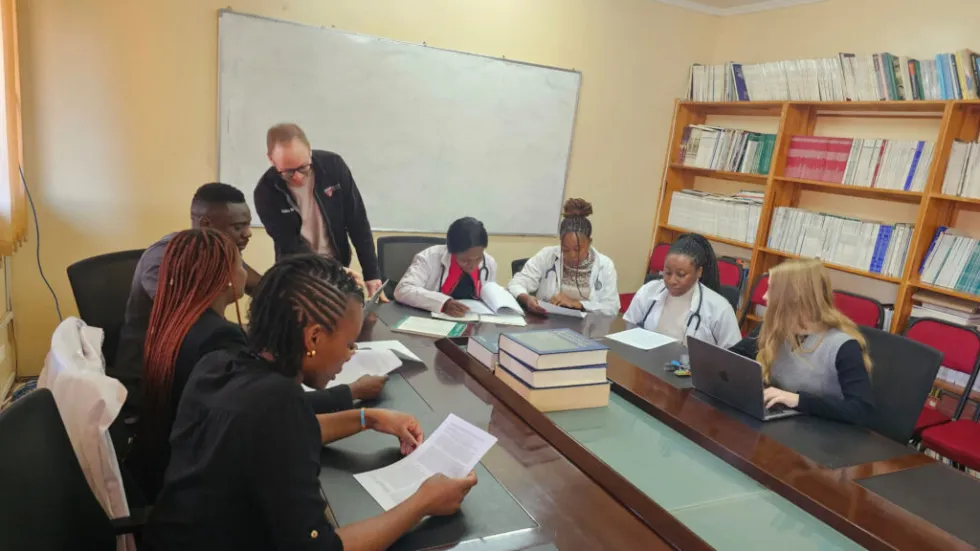
A small group learning session for neurology students at University Teaching Hospital in Lusaka, Zambia.
Authors: Dr Ndonji Chiwaya
Editor's Choice
World Neurology | Article posted on August 19, 2025
Link: https://worldneurologyonline.com/article/transforming-education-in-zambia
Educators are using the flipped classroom approach for the neurology portion of the curriculum to overcome neurophobia.
In the bustling lecture halls of Zambia's leading medical school, the University of Zambia School of Medicine (UNZA-SOM), a quiet revolution has been underway. The subject: Neurology — a discipline infamous for sparking "neurophobia" (or fear of neurology) among students around the globe. In sub-Saharan Africa, where educational resources are limited and neurology specialists are few, this fear is more than just an academic inconvenience; it's a barrier to critical care.
Educators in Zambia decided to challenge the status quo with a fresh approach: the flipped classroom model. No more marathon lectures with passive note-taking. Instead, students viewed neurology content before class via prerecorded online video lectures. They then spent valuable class time participating in interactive, small-group discussions focused on real clinical cases.
"It's about putting students at the center," said one of the lead facilitators behind the pilot program. "We wanted them to engage, not just absorb."
To test this model's effectiveness, a study was conducted by a group of collaborators, including:
- Dr. Kathryn Holroyd (Columbia University, New York, New York)
- Drs. Annie McDonough and Aaron Berkowitz (University of California San Francisco, California)
- Drs. Melody Asukile, Ndonji Chiwaya, and Mashina Chomba (UNZA-SOM and University Teaching Hospital, Lusaka, Zambia)
- Dr. Deanna Saylor (University of North Carolina – Chapel Hill, North Carolina)
The study enrolled over 360 fifth- and seventh-year medical students at UNZA-SOM during their internal medicine clerkships. The students were split into two groups: one followed the traditional lecture-based format, while the other used the flipped classroom approach for the neurology portion of the curriculum. Before and after the course, students completed a knowledge assessment, a survey of confidence diagnosing and managing neurologic conditions, and a course satisfaction survey.
Results That Speak Volumes
In work published in June 2025 in the Journal of Neurological Sciences, the official journal of the World Federation of Neurology,1 the authors demonstrated that students enrolled in the flipped classroom had a greater increase in knowledge assessment scores following the course. The students also showed stronger confidence in diagnosing and managing neurological conditions. Fifth-year students, in particular, benefited from earlier exposure to the interactive format.
Among fifth-year students, neurophobia levels dropped significantly. By encouraging active learning and peer collaboration, the flipped model appeared to ease anxiety and foster curiosity. Seventh-year students showed less change in their neurophobia. Educators believe prior exposure to traditional methods in neurology teaching might have played a role in this finding.
Across both year groups, flipped classroom participants (compared to traditional classroom students) reported greater satisfaction with the course, improved participation, and a sense of collaboration and connection with peers.
This study offers a ray of hope for regions where resources are limited but student potential is vast. By reimagining how neurology is taught, Zambia's educators have crafted a strategy that is not only scalable but also student-centered and impactful. With plans to expand flipped learning into other disciplines, the initiative sets a promising precedent. It is a reminder that innovation doesn't always require expensive equipment. Sometimes, a shift in mindset makes all the difference.
The course creators have made all flipped classroom course materials, including educational training, traditional lecture PowerPoint presentations, and case materials are available online for use by other educators.
As the next generation of Zambian doctors steps forward with a clearer understanding of, and renewed confidence in, diagnosing and managing neurological disorders, the message is clear: When students are empowered, education becomes transformative. •








